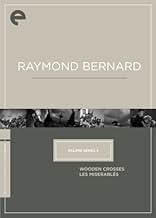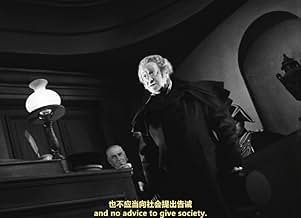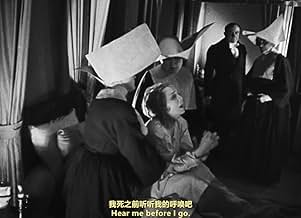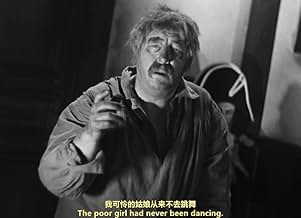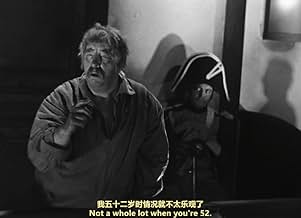Narra las vidas de numerosas personas a lo largo de veinte años en la Francia del siglo XIX, entretejidas por la historia del exconvicto Jean Valjean que huye de un inspector de policía obse... Leer todoNarra las vidas de numerosas personas a lo largo de veinte años en la Francia del siglo XIX, entretejidas por la historia del exconvicto Jean Valjean que huye de un inspector de policía obsesivo que lo persigue solo por un delito menor.Narra las vidas de numerosas personas a lo largo de veinte años en la Francia del siglo XIX, entretejidas por la historia del exconvicto Jean Valjean que huye de un inspector de policía obsesivo que lo persigue solo por un delito menor.
- Premios
- 1 premio en total
- Félix Tholomiez
- (sin acreditar)
Argumento
¿Sabías que...?
- CuriosidadesRe-released in France in 1951.
- PifiasIn the second part, Les Thenardier, when Jean Servais overhears the pair plotting to rob Valjean, Raymond Bernard can be heard softly directing him to leave the room ("Vite!").
- Citas
Cosette: [as she and Valjean witness a convoy of convicts being taken to the penal colonies] But father... are they... still human?
Jean Valjean: Sometimes.
- ConexionesFeatured in Testigo de excepción (1995)
I've read the book, and the author Victor Hugo has a certain kind of great, rolling oceanic rhythm, where he starts to set up a scene, appears to wander around adding elements, then slowly brings people and events to a staggering, shuddering climax two- or three hundred pages later. And he manages it several times in the one book. It's a remarkable technique, and no other film version of Les Mis that I've seen manages to capture that feeling of majestic, gigantic tension and release the way this one does.
Now, I've only seen the three-hour version of the Depardieu/Dayan version, not the original six-hour, which I've never been able to track down in a version with English subtitles.
But I've seen just about every other version, and they all have a disjointed sense of pace and continuity that comes from jamming a huge novel into a Cuisinart and filming the pages that survive.
For overall achievement, this one takes the prize. Individual scenes have been done more effectively in other versions, but for capturing the feeling of actually having read the book, this movie is the best.
Other versions have gone deeper into the dirt and filth of Old Paris; much of this film was shot on backlot streets where even the dirt is clean, like a Sam Goldwyn picture. Director Raymond Bernard is also a little too fond of tilting the camera for dramatic effect, but you get used to it quickly, and some of the German Expressionist lighting is very effective.
This is the only version I've seen that shows the actual revolution Hugo describes with sympathy and patience, and the character of Marius gains terrifically from it. By contrast, the attitude towards revolution is nervous and dismissive in the 1935 March/Boleslawski version, as Hollywood was run by Republicans in those days, and Marius inevitably comes off like a twerp. Not here.
Also, the class distinctions among the characters are etched far more clearly than in other adaptations. Today's egalitarian impulses usually tend to bland out such niceties, but our contemporary demands for comfort with these interactions are ignored in this movie from 1933.
Harry Baur as Valjean is a dramatic giant, a stocky, massive bunch of nerve endings. He is from the same school as Emil Jannings, but fortunately never plumbs the depths of Jannings' abysmal, moist self-pity. It should also be noted that Baur is better here than in Abel Gance's film about Beethoven. Some of the actors surrounding him in Les Mis are a bit obvious, but OTOH this has the best Gavroche, period.
Charles Vanel is the only Inspector Javert you are likely to see who was not affected by Charles Laughton's remarkable portrayal of the character, as that was not to be filmed until two years afterward. Laughton's Javert was so intense that it unbalanced that picture, so that the film wound up being about his agony, not Jean Valjean's, which is wrong.
Charles Vanel's Javert appears to be offhand, methodical, restrained, banal; unlike Laughton, he has no speech about why he does what he does, and he gets very few closeups. There is next to no exploration of his interior life, if any, and his death is handled very differently from what we have come to expect.
Past the initial surprise, I think that is one point of the film, that Javert is not a flamboyant, obsessive madman. Vanel's Javert is not a twitchy rogue cop like Anthony Perkins or a reptilian boogeyman like John Malkovich; this film is not a Homeric one-on-one duel to the death like "The Fugitive." Here, Javert symbolizes a government of anonymous and casual brutality. He is a willing cog in a machine that metes out rigid punishment and has no mechanism for tempering justice with mercy. This approach will definitely provoke you to thought, which you can't say about most movies.
Anyway, forget the star-studded comic book adaptations that are the norm for this title, and curl up with a good book. This one is on two DVDs, takes around five hours to watch, and you'll never regret it.
- tonstant viewer
- 4 jul 2008
- Enlace permanente
Selecciones populares
Detalles
- Duración4 horas 39 minutos
- Color
- Mezcla de sonido
- Relación de aspecto
- 1.37 : 1
Contribuir a esta página


